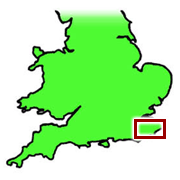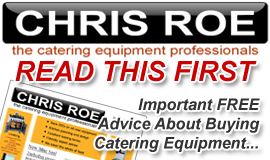
Read this first...
The advice on this page is only for customers in the county of Kent UK. Customers outside our area should contact their local catering equipment supplier.
Many pitfalls are out there to trap the unwary buyer. This is as true of catering equipment as of any other product or service.
We have seen a number of horror stories over the years, very often involving online purchases. Many internet suppliers are run from call centres whose staff have little or no knowledge of the business - a business that requires decades of experience to be able to advise customers properly.
A few points to note are listed below.
At the time of purchase:
- We would advise you to make sure the equipment is from an established manufacturer with a good dealer and parts network, otherwise you might have difficulty getting it repaired at a later date.
- Don't confuse cheapness with value. Poor quality equipment can be cheaper to buy, but frequent repairs and early replacement costs will usually outweigh any saving. You should also take into account extra wage bills when key equipment like a dishwasher is out of action.
- Is the item being sold with 'on-site warranty'? Does the supplier have a guaranteed response time on warranty calls? We have heard of customers waiting weeks for a visit, and then having to wait months for parts to be ordered from abroad.
- In the case of glasswashers and dishwashers in particular, we would strongly recommend purchasing only from a bona fide local supplier who will survey your site before purchase. We know of many internet purchases having to be returned because of incompatibility with water pressure, drainage height, power supply etc. Installing and commissioning a machine, including setting the detergent and rinse aid dosing, is also a job requiring specialist knowledge.
Delivery and unpacking:
- Ensure the equipment will fit into the space available, and through any doors or stairways.
- In these post-COVID days you will not be asked to sign for goods, however this makes it very awkward when they are damaged. You will have to unpack the items and inspect them thoroughly at the time of delivery and notify your supplier immediately of any damages. Small dents and warps can be difficult to spot in stainless steel panels. The best method is to remove the protective coating (see below) and look along the panel at reflected light.
- Most catering equipment is supplied with a protective adhesive plastic coating covering all the metal panels, inside and out. This can be very difficult to remove if you are not experienced (or even if you are, in many cases!). Some dismantling and re-assembly may be required. You will need a sharp craft knife or similar, and should score all joints and folds before you attempt to strip it off. Be sure to do this before the appliance is switched on; the polycoat can be nearly impossible to remove once it has been left for a while. If you have not done this before you should allow up to 30 minutes for a small appliance like a fryer and 1 hour or more for a larger item such as a chiller or cooker. Make sure you get all the plastic off; it will make a nasty mess inside an oven or fryer!
- DO NOT THROW THE PACKAGING AWAY, especially if you purchased online. If the equipment fails under warranty, you may well be asked to pack it up and return it for repair.
- A responsible catering equipment company will take care of all the above, and should also train your staff in the use and care of the equipment, at no extra cost.
Electrical appliances:
- Check the electricity supply: if the appliance is rated higher than 3 kilowatts, it will probably require a dedicated supply from the fuse board. Some appliances require a 3-phase supply.
- Appliances rated higher than 3 kilowatts are not usually supplied with a mains cable. You will require a single or 3-phase cable rated higher than the loading of the appliance. Regulations restrict the type and length of flexible supply cables. Cables can be very expensive, although if you are using an electrical contractor or bona fide installer, he may be able to purchase at a discount.
Gas appliances:
- Make sure you have lined up a Gas Safe (formerly CORGI) registered gas fitter who has the relevant commercial ticket. Gas Safe fitters with domestic accreditation are not allowed to work on commercial appliances.
- Check whether the appliance is supplied with the armoured gas hose required by current regulations. Most appliances are not supplied with the hose; you have to buy it separately at a cost of up to £100.00.
- Your extraction system must comply with the latest regulations (BS6173-2017 is current at the time of writing this page). Your Gas Safe fitter will not be able to install the equipment otherwise. In general, extraction systems require an interlock system to shut off the gas in the event of system failure, and will usually require 'make-up' (ie. incoming) air as well as expelled air. A reputable catering equipment supplier should be able to advise you on this.
Appliances which use water:
- Check that your water supply is at the correct pressure. Most dishwashers and water boilers require cold supply at a pressure of 2-4 bar. You will need to check this, as it is essential to the performance of the machine. If the supply pressure is outside this range you will probably require a booster pump or pressure reducer.
- Ensure the equipment complies with current water regulations as monitored under the Water Regulations Advisory Scheme. These are under review as we write.
- Many commercial dishwashers drain by gravity like a sink. If the drain is higher than the machine you will need to have it altered, or specify a model with pumped drainage.
- Almost all water supplied in Kent is hard or very hard, meaning a softener must be installed to protect the equipment from damage by limescale. Different types of softener suit different types of equipment. A bona fide catering equipment supplier will advise on your requirements.
What to do if something goes wrong:
- If you purchased online you will need to check those T&Cs you accepted. Some items may be covered by on-site warranty (although you may have to wait a while for the engineer to attend). Others will have to be packed up in their original box and returned at your expense to the supplier for repair.
- If you purchased from a reputable local supplier you should be able to relax, because the equipment ought to be under a parts and labour warranty. A quick phone call should get the fault attended to within a few days.
- If you purchased from ourselves you can relax even more, because we supply only top quality equipment from reputable manufacturers. In case anything does go wrong, we carry an extensive range of spare parts, and anything we don't carry can usually be obtained within a day or two.
If you've read this far, congratulations! You might have noticed that our guidance leans towards steering buyers away from online purchases. Our intention isn't solely to capture a larger market share; it's also rooted in our ethical outlook. We've navigated the challenges of building a strong business, and we're committed to preventing others from making costly mistakes.
We are not the only established company in the market place, and we welcome comparison with our competitors, because we truly believe we offer the BEST ADVICE, BEST EQUIPMENT, BEST SERVICE, and BEST VALUE.

We wish you success in your business (whichever supplier you choose!), and we hope you will benefit from the information on this page.

